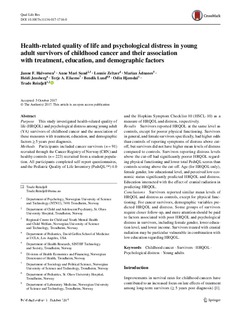Health-related quality of life and psychological distress in Young adult survivors of childhood cancer and their Association with treatment, education, and demographic factors
Fagervoll, Janne Strand; Sund, Anne Mari; Zeltzer, Lonnie K.; Ådnanes, Marian; Jensberg, Heidi; Eikemo, Terje Andreas; Lund, Bendik; Hjemdal, Odin; Reinfjell, Trude
Journal article, Peer reviewed
Published version
Permanent lenke
http://hdl.handle.net/11250/2587550Utgivelsesdato
2017Metadata
Vis full innførselSamlinger
Originalversjon
Quality of Life Research. 2017, Published ahead of print 1-9. 10.1007/s11136-017-1716-0Sammendrag
Purpose This study investigated health-related quality of life (HRQOL) and psychological distress among young adult (YA) survivors of childhood cancer and the association of these measures with treatment, education, and demographic factors ≥ 5 years post diagnosis. Methods Participants included cancer survivors (n = 91) recruited through the Cancer Registry of Norway (CRN) and healthy controls (n = 223) recruited from a student population. All participants completed self-report questionnaires, and the Pediatric Quality of Life Inventory (PedsQL™) 4.0 and the Hopkins Symptom Checklist-10 (HSCL-10) as a measure of HRQOL and distress, respectively. Results Survivors reported HRQOL at the same level as controls, except for poorer physical functioning. Survivors in general, and female survivors specifically, had higher odds than controls of reporting symptoms of distress above cut-off, but survivors did not have higher mean levels of distress compared to controls. Survivors reporting distress levels above the cut-off had significantly poorer HRQOL regarding physical functioning and lower total PedsQL scores than controls scoring above the cut-off. Age (for HRQOL only), female gender, low educational level, and perceived low economic status significantly predicted HRQOL and distress. Education interacted with the effect of cranial radiation in predicting HRQOL. Conclusions Survivors reported similar mean levels of HRQOL and distress as controls, except for physical functioning. For cancer survivors, demographic variables predicted HRQOL and distress. Some groups of survivors require closer follow-up, and more attention should be paid to factors associated with poor HRQOL and psychological distress in survivors, including female gender, lower education level, and lower income. Survivors treated with cranial radiation may be particular vulnerable in combination with low education regarding HRQOL.

